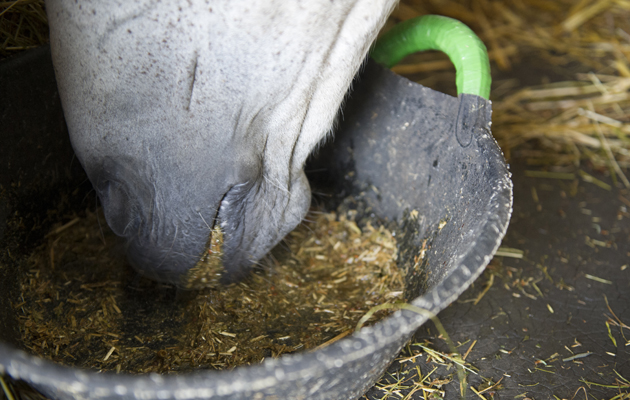Equine welfare charities remain pushed to maximum capacity as a result of a “systematic failure of ownership and enforcement” — but it is hoped possible new legislation could help.
Charities are facing challenges with a rise in complex multi-agency cases involving large numbers of horses, but say they have to act “within the law”, whereby if animals are being kept in legal conditions, their hands are tied.
{"content":"PHA+V29ybGQgSG9yc2UgV2VsZmFyZSBjaGllZiBleGVjdXRpdmUgUm9seSBPd2VycyB0b2xkPGVtPiBIJmFtcDtIPC9lbT4gdGhlIGNoYXJpdHnigJlzIGNlbnRyZXMgaGF2ZSB0YWtlbiBpbiAyNTMgaG9yc2VzIHRoaXMgeWVhciBjb21wYXJlZCB0byAyNjYgaW4gMjAxOCwgYnV0IHNhaWQgdGhlIGRlY2xpbmUgd2FzIGFzIGNlbnRyZXMgYXJlIGZ1bGwg4oCUIG5vdCBvd2luZyB0byBhIGRlY3JlYXNlIGluIGNhc2VzLjwvcD4KPHA+4oCcV2hpbGUgdGhlIG51bWJlciBvZiBob3JzZXMgdmlzaWJseSBmbHktZ3JhemluZyBoYXMgZGVjcmVhc2VkIGFzIGEgcmVzdWx0IG9mIHRoZSBDb250cm9sIG9mIEhvcnNlcyBBY3QsIHRoZSBzdGFyayByZWFsaXR5IGlzIHRoYXQgZGVtYW5kcyBvbiB3ZWxmYXJlIGNoYXJpdGllcyBhbmQgdGhlIG51bWJlciBvZiBob3JzZXMgYXQgcmlzayByZW1haW4gY29uc2lzdGVudGx5IGhpZ2ggYXQgYXJvdW5kIDcsMDAwLiBTbyB0aGlzIGlzIG5vIGxvbmdlciBzbyBtdWNoIG9mIGEgaG9yc2UgY3Jpc2lzIGFzIHN5c3RlbWljIGZhaWx1cmUgb2Ygb3duZXJzaGlwIGFuZCBlbmZvcmNlbWVudCzigJ0gc2FpZCBNciBPd2Vycy48L3A+CjxwPjxkaXYgY2xhc3M9ImFkLWNvbnRhaW5lciBhZC1jb250YWluZXItLW1vYmlsZSI+PGRpdiBpZD0icG9zdC1pbmxpbmUtMiIgY2xhc3M9ImlwYy1hZHZlcnQiPjwvZGl2PjwvZGl2PjxzZWN0aW9uIGlkPSJlbWJlZF9jb2RlLTMxIiBjbGFzcz0iaGlkZGVuLW1kIGhpZGRlbi1sZyBzLWNvbnRhaW5lciBzdGlja3ktYW5jaG9yIGhpZGUtd2lkZ2V0LXRpdGxlIHdpZGdldF9lbWJlZF9jb2RlIHByZW1pdW1faW5saW5lXzIiPjxzZWN0aW9uIGNsYXNzPSJzLWNvbnRhaW5lciBsaXN0aW5nLS1zaW5nbGUgbGlzdGluZy0tc2luZ2xlLXNoYXJldGhyb3VnaCBpbWFnZS1hc3BlY3QtbGFuZHNjYXBlIGRlZmF1bHQgc2hhcmV0aHJvdWdoLWFkIHNoYXJldGhyb3VnaC1hZC1oaWRkZW4iPg0KICA8ZGl2IGNsYXNzPSJzLWNvbnRhaW5lcl9faW5uZXIiPg0KICAgIDx1bD4NCiAgICAgIDxsaSBpZD0ibmF0aXZlLWNvbnRlbnQtbW9iaWxlIiBjbGFzcz0ibGlzdGluZy1pdGVtIj4NCiAgICAgIDwvbGk+DQogICAgPC91bD4NCiAgPC9kaXY+DQo8L3NlY3Rpb24+PC9zZWN0aW9uPjwvcD4KPHA+4oCcV2UgaGF2ZSB0YWtlbiBpbiAxMjEgaG9yc2VzIHVuZGVyIHByb3NlY3V0aW9uIGNvbXBhcmVkIHRvIDExMCBsYXN0IHllYXIgYW5kIDc2IGluIDIwMTcuIFRoaXMgaGFkIGEgc2lnbmlmaWNhbnQgaW1wYWN0IGJlY2F1c2Ugd2hpbGUgdGhleSBhcmUgdGhlIHN1YmplY3RzIG9mIHByb3NlY3V0aW9uLCB3ZSBhcmUgbGltaXRlZCBvbiB3aGF0IHdlIGNhbiBkbzsgdGhleSBjYW5ub3QgYmUgY2FzdHJhdGVkLCBicm91Z2h0IG9uIG9yIHJlaG9tZWQgdW50aWwgdGhlIGNhc2UgaXMgY29uY2x1ZGVkLCB3aGljaCBjYW4gdGFrZSB0d28geWVhcnMgb3IgbW9yZS4gQ2FzZXMgYXJlIGJlY29taW5nIGluY3JlYXNpbmdseSBjb21wbGV4LCBvZnRlbiBmZWF0dXJpbmcgZ3JvdXBzIG9mIGhvcnNlcywgYW5kIHNvbWV0aW1lcyBhIG11bHRpLWFnZW5jeSBhcHByb2FjaCBpcyB0aGUgb25seSB3YXkgb2YgcmVzb2x2aW5nIHRoZW0sIHdoaWNoIHBsYWNlcyBoZWF2aWVyIGRlbWFuZHMgb24gb3VyIHJlc291cmNlcy48L3A+CjxwPuKAnE9uIGEgbW9yZSBwb3NpdGl2ZSBub3RlLCB0aGVyZSBoYXMgYmVlbiBhIHN0ZXAgZm9yd2FyZCBvbiB0aGUgbGljZW5zaW5nIG9mIHJlc2N1ZSBhbmQgcmVob21pbmcgY2VudHJlcyBpbiBFbmdsYW5kIGFuZCBTY290bGFuZCwgZm9yIHdoaWNoIHdlIGhvcGUgdGhlcmUgd2lsbCBiZSBwcm9ncmVzcyBvbiBjb25zdWx0YXRpb24gbmV4dCB5ZWFyIGFuZCBwb3NzaWJsZSBsZWdpc2xhdGlvbi7igJ08L3A+CjxwPlJTUENBIGVxdWluZSB3ZWxmYXJlIGV4cGVydCBNYXJrIEtlbm5lZHkgdG9sZCA8ZW0+SCZhbXA7SDwvZW0+IHRoZSBjaGFyaXR5IHJlaG9tZWQgMjI2IGhvcnNlcyBpbiAyMDE5LCBidXQgdG9vayBpbiBtb3JlIHRoYW4gODIwIHRoaXMgeWVhciBjb21wYXJlZCB0byA3NzcgaW4gMjAxOCwgYW5kIHJlY2VpdmVkIG1vcmUgdGhhbiAyMCwwMDAgd2VsZmFyZSBjYWxscy48L3A+CjxkaXYgY2xhc3M9ImFkLWNvbnRhaW5lciBhZC1jb250YWluZXItLW1vYmlsZSI+PGRpdiBpZD0icG9zdC1pbmxpbmUtMyIgY2xhc3M9ImlwYy1hZHZlcnQiPjwvZGl2PjwvZGl2Pgo8cD7igJxDb3Bpbmcgd2l0aCB0aGUgbGV2ZWxzIG9mIG5lZ2xlY3Qgb3VyIGluc3BlY3RvcnMgc2VlIGRhaWx5IGlzIGh1Z2VseSBjaGFsbGVuZ2luZzsgdGhpcyBpcyBhbXBsaWZpZWQgd2hlbiB3ZWxsLW1lYW5pbmcgYW5pbWFsIGxvdmVycyB0YWtlIHRvIHNvY2lhbCBtZWRpYSBhY2N1c2luZyBjaGFyaXRpZXMgb2YgZmFpbGluZyB0byBhY3QsIHdoaWxlIGZhaWxpbmcgdG8gcmVjb2duaXNlIHRoYXQgdGhlIFJTUENBIG11c3QgYWN0IHdpdGhpbiB0aGUgbGF3LOKAnSBzYWlkIERyIEtlbm5lZHkuPC9wPgo8cD7igJxXZSBtYXkgbm90IGxpa2UgY29uZGl0aW9ucyBhbmltYWxzIGFyZSBrZXB0IGluLCBidXQgaWYgdGhvc2UgYXJlIGxlZ2FsLCBvdXIgaGFuZHMgYXJlIHRpZWQuIFdlIGFyZSBvZnRlbiB3b3JraW5nIGJlaGluZCB0aGUgc2NlbmVzLCBidXQgYXJlIHJlc3RyaWN0ZWQgYnkgd2hhdCB3ZSBjYW4gc2F5IHB1YmxpY2x5IGFib3V0IGEgc2l0dWF0aW9uLiBUaGlzIGNhbiByZXN1bHQgaW4gcmlzaW5nIHRlbnNpb25zIGFuZCBwZW9wbGUgdGFraW5nIHRoZSBsYXcgaW50byB0aGVpciBvd24gaGFuZHMgdG8g4oCYcmVzY3Vl4oCZIGhvcnNlcyB3aGljaCB0aGV5IGZlZWwgY2hhcml0aWVzIGFyZSBpZ25vcmluZyzigJ0gKG5ld3MsIDEzIEp1bmUpLjwvcD4KPGRpdiBjbGFzcz0iYWQtY29udGFpbmVyIGFkLWNvbnRhaW5lci0tbW9iaWxlIj48ZGl2IGlkPSJwb3N0LWlubGluZS00IiBjbGFzcz0iaXBjLWFkdmVydCI+PC9kaXY+PC9kaXY+CjxwPlJlZHdpbmdzIGNoaWVmIGV4ZWN1dGl2ZSBMeW5uIEN1dHJlc3MgdG9sZCA8ZW0+SCZhbXA7SDwvZW0+IHRoZSBjaGFyaXR5IGhhcyB0YWtlbiBpbiAxMDUgZXF1aW5lcyB0aGlzIHllYXIsIGNvbXBhcmVkIHRvIDk0IGluIDIwMTguPC9wPgo8ZGl2IGNsYXNzPSJhZC1jb250YWluZXIgYWQtY29udGFpbmVyLS1tb2JpbGUiPjxkaXYgaWQ9InBvc3QtaW5saW5lLTUiIGNsYXNzPSJpcGMtYWR2ZXJ0Ij48L2Rpdj48L2Rpdj4KPHA+4oCcVGhpcyB5ZWFyIHdl4oCZdmUgYXR0ZW5kZWQgdGFsa3Mgd2l0aCB0aGUgZ292ZXJubWVudCBhbG9uZ3NpZGUgb3RoZXIgY2hhcml0aWVzIHRvIGRpc2N1c3Mgd2F5cyB0byBhZGRyZXNzIHRoZSByb290IGNhdXNlcywgc3VjaCBhcyB0YWNrbGluZyBpbmRpc2NyaW1pbmF0ZSBicmVlZGluZywgaW5jcmVhc2luZyB0aGUgdHJhY2VhYmlsaXR5IHRocm91Z2ggbmV3IG1pY3JvY2hpcHBpbmcgbGF3cyBhbmQgdGhlIGludHJvZHVjdGlvbiBvZiB0aGUgQ2VudHJhbCBFcXVpbmUgRGF0YWJhc2UsIGFzIHdlbGwgYXMgdGhlIHBvdGVudGlhbCBsaWNlbnNpbmcgb2YgcmVzY3VlIGNlbnRyZXMs4oCdIHNoZSBzYWlkLjwvcD4KPHA+Um9zaWUgTW9nZm9yZCwgc2VuaW9yIGhvcnNlIHJlaG9taW5nIG1hbmFnZXIgYXQgQmx1ZSBDcm9zcywgdG9sZCA8ZW0+SCZhbXA7SDwvZW0+IHRoZSBjaGFyaXR54oCZcyBjZW50cmVzIGFyZSBmdWxsIGFuZCB0aGUgZGVtYW5kIGZvciB3ZWxmYXJlIHN1cHBvcnQg4oCcb25seSBzZWVtcyB0byBiZSBpbmNyZWFzaW5n4oCdLjwvcD4KPGRpdiBjbGFzcz0iaW5qZWN0aW9uIj48L2Rpdj4KPHA+4oCcV2UgYXJlIGZpbmRpbmcgc29tZSBzbWFsbGVyIHJlc2N1ZSBvcmdhbmlzYXRpb25zIGFuZCBzYW5jdHVhcmllcyBhcmUgYmVjb21pbmcgb3ZlcndoZWxtZWQgd2l0aCB0aGUgbnVtYmVycyBpbiB0aGVpciBjYXJlIGFuZCB3ZWxmYXJlIGJlY29tZXMgY29tcHJvbWlzZWQuIFdlIHdvdWxkIGxpa2UgdG8gc2VlIHRoZSBpbnRyb2R1Y3Rpb24gb2YgbGljZW5zaW5nIGFuZCByZWd1bGF0aW9uIG9mIHJlc2N1ZSBjZW50cmVzIGFuZCBzYW5jdHVhcmllcyB0byBwcmV2ZW50IGxhcmdlIGdyb3VwcyBvZiBob3JzZXMgc3VkZGVubHkgbmVlZGluZyBvdXRzaWRlIGhlbHAs4oCdIHNoZSBzYWlkLjwvcD4KPHA+Cg=="}
You may also be interested in…
Credit: RSPCA
‘Buying horses out of perceived welfare situations is not rescuing; it is creating a market for horses to receive poor
Lilly, one of the ponies available at the RSPCA Southridge centre in Hertfordshire
Credit: RSPCA
‘Adoptober’ aims to showcase the charity’s horses and ponies’ versatility and capability, whether they are ridden horses, companion animals or
Credit: Bernadette Langfield
We talk to Bernadette Langfield who set up and runs Shy Lowen, an equine sanctuary in Liverpool
Animal welfare organisations have attacked the growing trend of rescuing and importing European horses destined for slaughter.
Over-rugging and rider and horse obesity are among the issues affecting horses in this country, World Horse Welfare has warned
Stay in touch with all the news in the run-up to and throughout the major shows and events during 2026 and beyond with a Horse & Hound subscription. Subscribe today for all you need to know ahead of these major events, plus online reports on the action as it happens from our expert team of reporters and in-depth analysis in our special commemorative magazines. Have a subscription already? Set up your unlimited website access now
H&H senior news writer
Since joining H&H in 2018, Becky has covered a broad range of equestrian news including welfare matters, veterinary studies, FEI Tribunal hearings and road safety campaigns. She has also interviewed top riders including Scott Brash, John Whitaker and Ian Stark, to name just a few. Becky’s reporting has taken her to Canada for Spruce Meadows and France for Pau five-star, as well as the Royal Highland and Blair Castle International Horse Trials closer to home. She was also a key part of the remote reporting team for the Tokyo Olympics and the Europeans.






